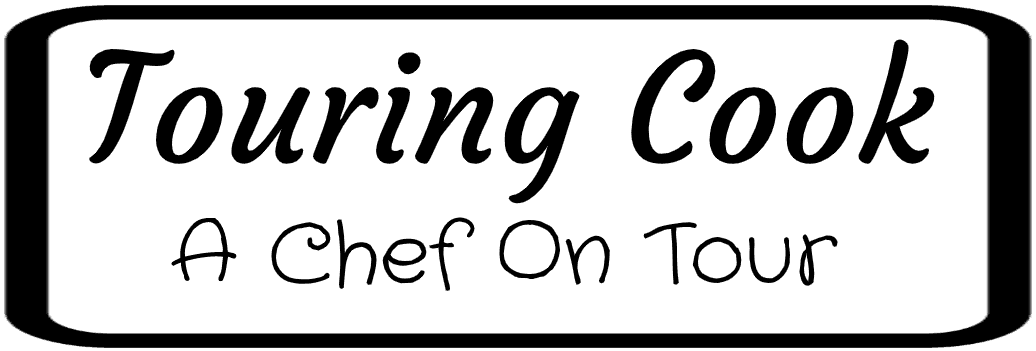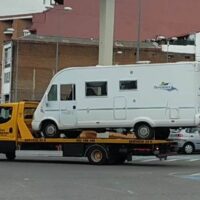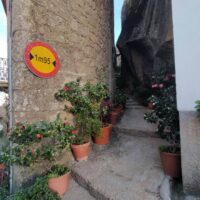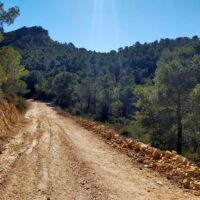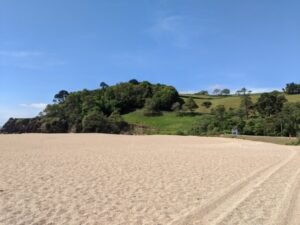Social Media would have you believe motorhome life is all sunshine and roses.
But that’s not the whole story. There is a not-so-glam side too.
Disclosure: some of the links on this site are affiliate links. This means that at no additional cost to you I may earn a small commission if you click through and make a purchase. In addition, as an Amazon Associate, I earn from qualifying purchases.
Social Media portrays motorhome life as beautiful people in stunning locations enjoying their best life.
Yes, travelling around in a van or motorhome allows you to visit some amazing places, meet some lovely people, and gives you complete freedom to roam where you will.
We love it. We haven’t been motorhoming that long, but already we want to go further, see more, make more memories.
But of course, as with most things, that isn’t the whole story. It’s not all sunshine and roses. It never is. There is a not-so-glam side to motorhome life as well that no one ever seems to want to talk about.
It’s that not-so-glam side of motorhome life that is the subject of this post.
Parking
Whether it be finding a parking space at the supermarket, parking overnight, or just finding somewhere to park up near something you want to see.
Finding somewhere to park a larger vehicle can sometimes be quite challenging.
Height restrictions, width restrictions, narrow bays, time limits, local by-laws, “no motorhomes”, “no overnight parking”. Sometimes it seems that motorhomes just aren’t welcome anywhere.
Sadly in many parts of the UK this can be the case.
In many other parts of Europe, however, that isn’t so.
Rather than trying to stop motorhomes from visiting the towns and villages, they recognise the rise in popularity of motorhome ownership, and the additional income that allowing them to park nearby brings.
Often the centre of towns and villages across Europe aren’t suitable for larger vehicles. But rather than just ban them, and discourage them from stopping, they take a somewhat different approach.
Instead, they provide parking areas just outside the village or town. Often free of charge, and frequently with facilities for emptying waste, both grey and black, and for topping up with fresh water.
The expectation is that those people using the facilities provided will visit the town or village and spend some money there, although there is no obligation to do so,
They are called different things in different countries.
- France: Aires de Service or Stationment pour Camping-Car
- Spain: Area de servicios para autocaravanas
- Germany: Stellplätze or Reisemobileplätze
- Italy: Aree di Sosta
There are several apps available that can help find suitable parking spots, both here in the UK and abroad. For abroad “all the Aires” books from vicarious books are another option.
Water
Water, water everywhere. Nor any drop to drink.
You might think finding fresh water to fill your tank isn’t that hard. Equally somewhere to empty wastewater. There must be plenty of places, right?
Well, it turns out that it’s not always as easy as you might expect. We have spent far too long scouring apps and the internet. Driving from place to place. Getting more and more frustrated, Many campsites won’t let you use their facilities if you aren’t staying there – even if you offer to pay.
Laundry
When you are used to being able to put items into a washing machine whenever you want, then having to find a laundrette close to somewhere you can park can be a chore.
It is also something of a balancing act. With limited storage, finding somewhere to store dirty laundry can be difficult. Plus you only have a limited amount of clothing etc.
And then of course drying laundry can be a challenge. Some people carry clothes airers with them, or tumble dry in the laundrette. Drying clothes in the motorhome, however, isn’t really practical due to lack of space and the subsequent condensation problems.
Space
Living in a box. By their very nature, vans and motorhomes are small spaces.
Inevitably that means that with two or more people in that space, you are going to get in each other’s way.
There’s very little room to do anything. Cooking a meal, for example, requires military planning to get everything prepared and hot at the correct time.
And personal space – forget it!
Breakdowns
A motorhome is a mechanical vehicle as well as a home. That means things can and do go wrong. Not just with the engine, but also with the equipment in the habitation area.
When things do go wrong it can be devastating. If the van has to go to a garage for maintenance, you lose your home too.
Seeing our motorhome being driven away on the back of a rescue truck in Spain was hard, to say the least!
On our relatively short first trip, we had multiple issues to deal with – punctures, replacement tyres, brakes, engine management light, leaky roof, broken rear light assembly, leaking water pump, broken running lights, and broken wing mirror to name a few
Toilets
Many vans have cassette toilets on board nowadays. But even with a self-contained unit, there are still issues.
Although we have a toilet, we don’t like to use it for number twos. Mainly because it is difficult to keep clean. We prefer to find a public toilet if at all possible, or failing that, bag it.
Whatever your preference, disposing of waste can be a problem. Chemical toilets cannot be emptied into any old public toilet. They have to be emptied into designated containers specifically for that purpose. And finding somewhere to empty isn’t always easy.
Internet
On board internet is something that can be added to a van. They often rely on sim cards and associated phone networks for the data, so can be patchy and slow.
Visiting coffee shops and cafes to use their internet is also an option.
I suppose the point is, having stable, fast internet isn’t really possible whilst travelling around unless you wish to invest large sums of money in, for example, satellite technology.
The Weather
The weather. Something we Brits love to talk about.
It’s wall-to-wall sunshine and blue skies everywhere we go, isn’t it?
Of course, it isn’t! Like everyone else we experience all types of weather.
Hailstones? It’s like sitting inside a drum.
Rain? you can’t help but look up to check for leaks.
Snow and Ice? it may look pretty, but driving can be hazardous, and an accident can cost you your home too.
Sunny? it can be a sweatbox.
Freezing cold? A joy when the frost protection valve dumps all your fresh water on the road!
Strong winds? sets the motorhome a-rocking (and not in a good way!)
Also, getting caught in the rain means finding some means of drying items in the limited space of the van – it can look akin to a Chinese laundry in there sometimes!
Navigation
With the best will in the world, two sat navs and any amount of pre-planning things go wrong.
The only time we have got close to murdering each other whilst travelling around in our motorhome is because of the SatNav.
I suppose it’s understandable really. In an unfamiliar country, road signs in a foreign language, driving on the wrong side of the road…..
Sometimes you just don’t seem to be able to get where you want to go. Others the roads can get very interesting, narrow, windy, not suitable for larger vehicles.
Other times the SatNav just seems to throw a wobbler – trying to send you down non-existent roads. Or you program in a point of interest and the SatNav will try and take you there rather than to the car park – although you could argue that that is our fault for not double-checking exactly where it is trying to take us.
Power
Unless you stay at campsites and use EHU regularly then managing the leisure battery can be difficult.
We had a 140W solar panel charging a single leisure battery and the engine battery. We managed well over two weeks in Scotland without hooking up to a power supply. However, we found that we had to be very careful about managing the battery. Several mornings we woke up to an almost flat battery as the heating pump had drained it overnight.
We found we had to use fairy lights and candles as an alternative to help conserve battery power.
We have just had the battery system upgraded to twin leisure batteries in an attempt to allow us to stay “off-grid” as much as possible.
I haven’t gone into great detail about anything in particular in this post, so if you would like me to expand on anything please leave a comment and I will endeavor to write another separate post on the topic.
Happy Motorhoming.
Hope You Enjoy!
Please leave us a comment!
